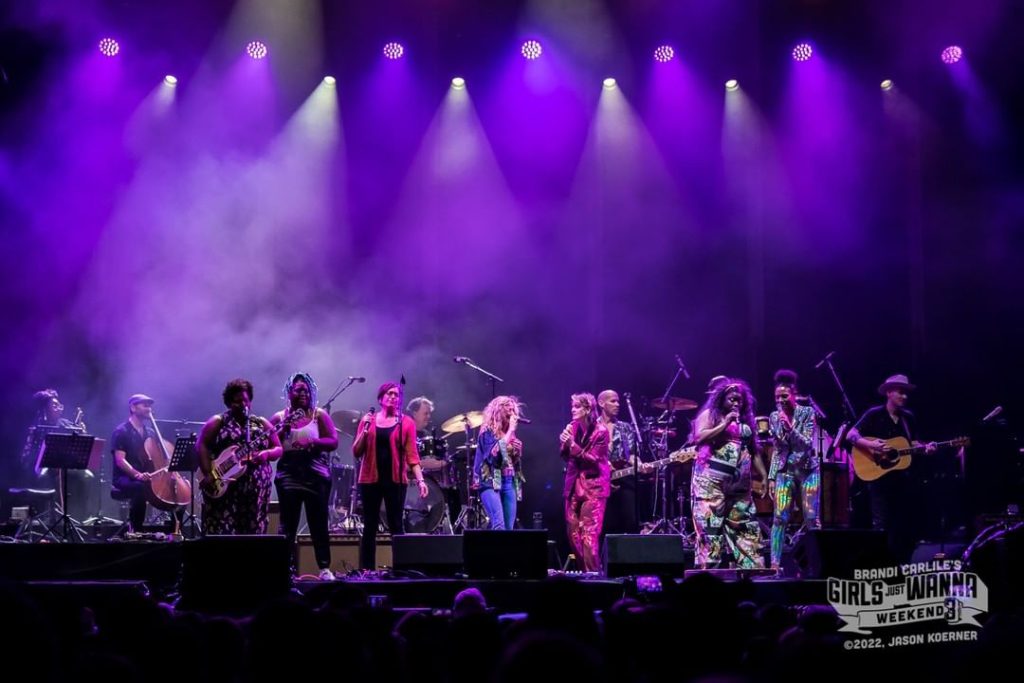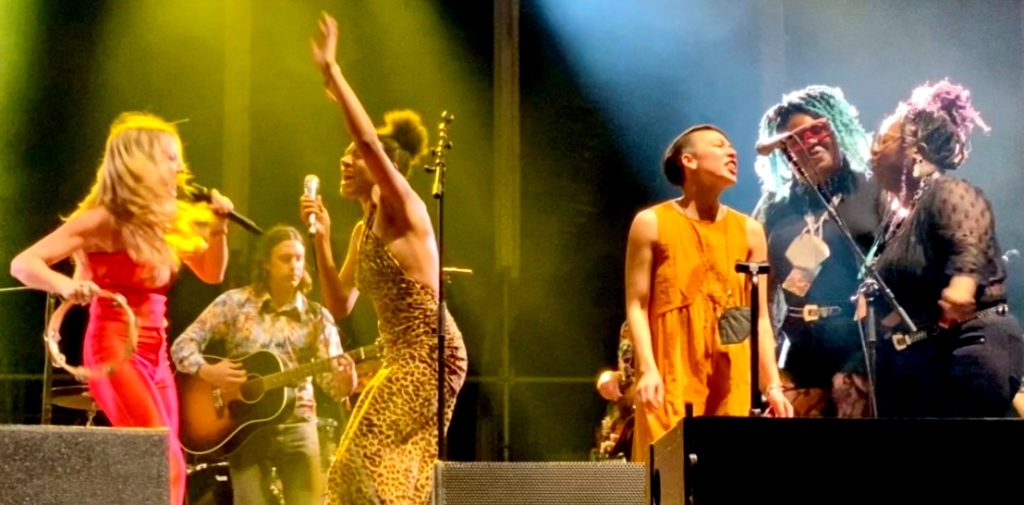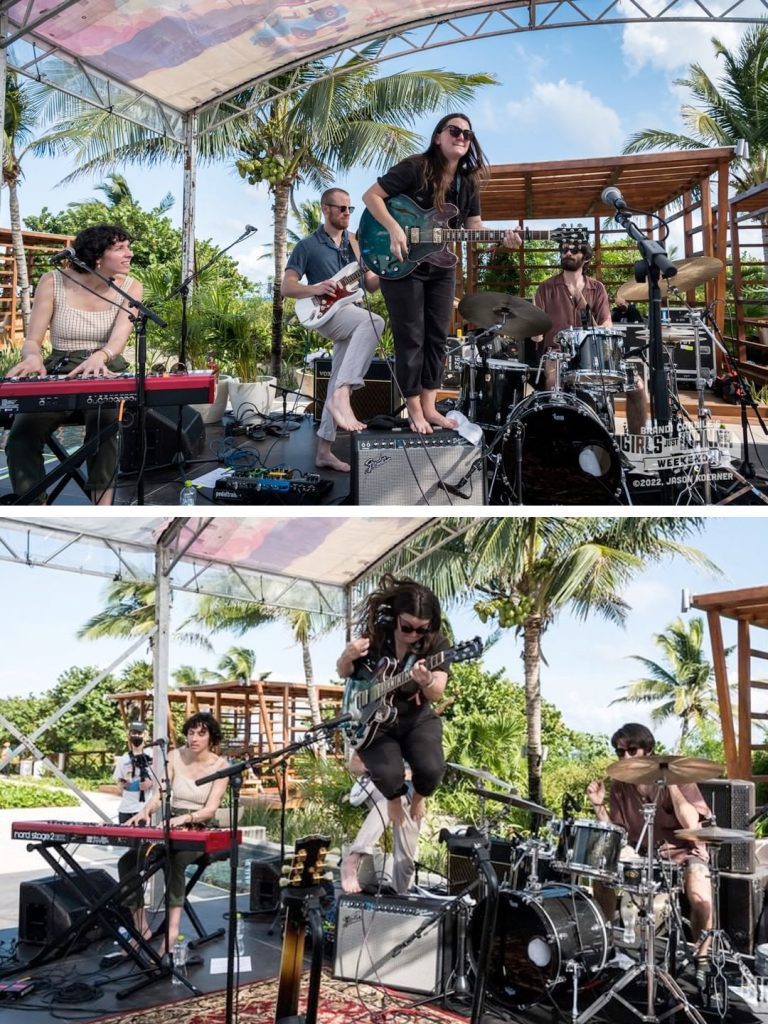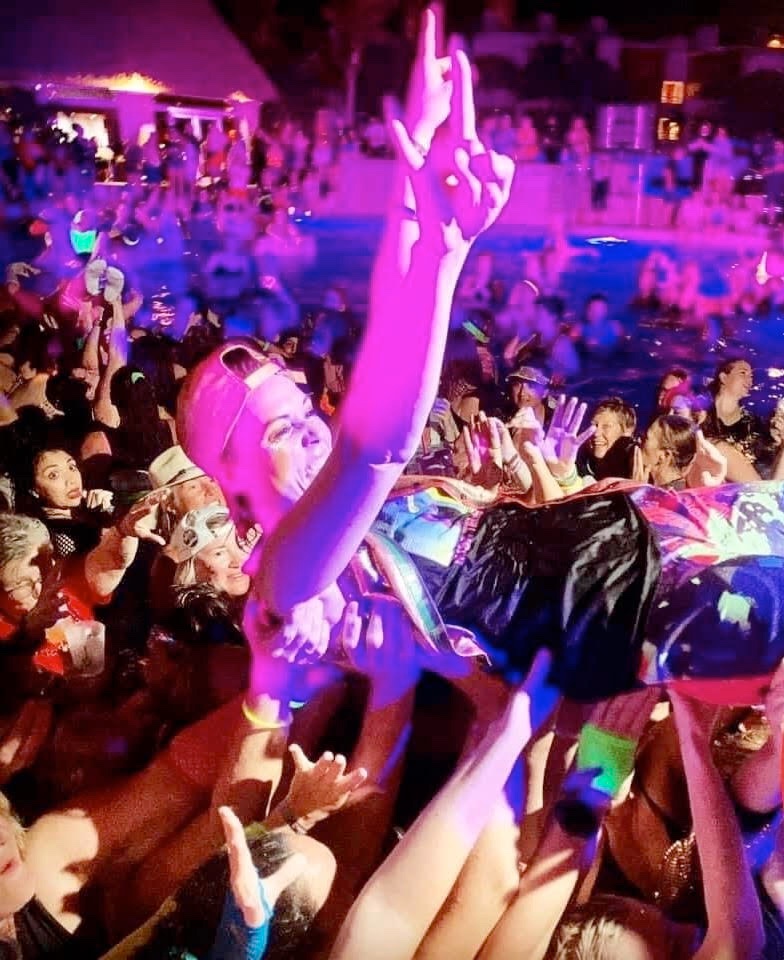Girls Just Wanna Weekend 3: Bramily Paradise
By Laurie Holloway

The iridescent Brandi Bubble floated through watercolor skies into the Mexican Riviera last week, a full-on blast of euphoria from the third Girls Just Wanna Weekend.
Inclusion is imprinted into Brandi Carlile’s annual sold-out beach event, a celebration of women in music, of queer artists in music, of Black women in music, of artists living out loud and the allies who support them. This year, it also was a release, an embrace of living after a two-year covid hiatus decimated the live music community.
In just three years, GJWW has evolved into a rich tapestry stitched by the deep roots of women’s music festivals, Pride parades, Lilith Fair, and artists and fans brave enough to stand up through decades of anti-gay and anti-woman cruelty. Its all-female, very gay A-list lineup is unique in a world where women and LGBTQ+ performers are an afterthought, if they’re thought of at all. Brandi (the first name suffices when you’re Bramily) flings open the closet doors, then kicks them off the hinges and sets them on fire.
GJWW came to life three years ago to create headlining spots for women and prove to a myopic industry that they can sell out an international festival. Men are welcome at GJWW, both in the audience and on stage next to the bold-faced names, but it’s first and foremost a sisterhood. That sorority includes heavy representation from lesbians who’ve supported Brandi since long before the Grammy wins and Colbert appearances and designer shoes. It’s a freeing space, without the dismissiveness, gaslighting or overt bullying women endure every day. Men who attend understand that these four days aren’t about them. Every attendee understands that this festival is built on light, not darkness.
GJWW3 was an utter repudiation of shrouded queerness, an arms-flung-wide passionate embrace of LGBTQ+, as well as a celebration of Black women artists who’ve labored decades to finally taste “overnight” success.

At the Fest
Brandi’s “beautiful island of misfits” fans settle in fast and hard. Rainbow flags flap, shimmering Bramily stickers festoon Yeti tumblers, and colorful T-shirts and floats proclaim that love is love and y’all means all.
Any doubts about the depth of queerness are assuaged by one example: All needs, no matter how tiny or large or weird, are met by an ad-hoc Lesbian Sisterhood of Preparedness, coordinated through social media and group chats. (Anyone have Mylanta? A MicroSD adapter? Why is that guy carrying around the raptor? Has anyone seen my float/sandals/glasses/wife? Who’s giving away the handmade guitar pick bottle openers? Asked and answered.)
The lineup blends country, Americana, blues, rock, and roots. Headliners steadily pull lesser-known artists on stage, authentically celebrating their gifts.
Allison Russell, who self-describes as queer, brought lightning from the main stage and intimate waterside sets alike, with three fresh Grammy nominations from the staggering “Outside Child” album in her pocket.
The mesmerizing Celisse, who shreds an electric Gibson like Sister Rosetta Tharpe is sitting on her shoulder, is out and outspoken. Both spoke candidly as BIPOC and queer artists about representation, racism and misogyny in music at a panel with Amy Ray (Indigo Girls) and Margo Price.

When she wasn’t reveling in the beach paradise with her girlfriend, Amythyst Kiah unleashed her striking, powerful voice on stages large and small. Lesbian Katie Pruitt belted out a Pat Benatar classic and then crowd-surfed around a midnight pool party. The Indigo Girls, queer icons since the late ’80s, were back again in full force.
Straight allies, from Sheryl Crow to Tanya Tucker, Yola, Lucius, Margo Price and KT Tunstall, held the line of inclusivity, as in the past.
GJWW’s final concert is always themed to “Ladies of the ’80s,” and the neon-clad crowd of 2,000-plus roared as Russell launched it with “Don’t ya know, talking about a revolution sounds like a whisper…” The homage to the brilliant Tracy Chapman pinned the circle closed between queer artists of the past and present.
Hot Tub Time Machine

The festival closes with an exuberant, super-gay Hot Tub Party into the early morning hours, where Brandi, the Twins and other artists shimmy and dance their way through exuberant, screaming throngs, sharing tequila shots before being crowd-surfed around the pool.
In another full circle, a superstar lesbian who shares her pain of not being invited to parties as a youth throws one of the most breathtaking and open bashes you can imagine. “I feel great responsibility in representing marginalized queer people in rural America who are raised on country and roots music but are repeatedly and systematically rejected by the correlating culture,” Brandi wrote after Grammy nominations were released last fall. “Every rung I can sling my gay sequined boot up on top of gets queer people a little higher on the ladder to being seen as just a bit more human in the great American roots landscape.”
Even as their fame flourishes, Brandi and her straight twin bandmates, Phil and Tim Hanseroth, keep pitching a large tent. The flaps are open to all, and it’s easy to find.
Just look for the rainbows.